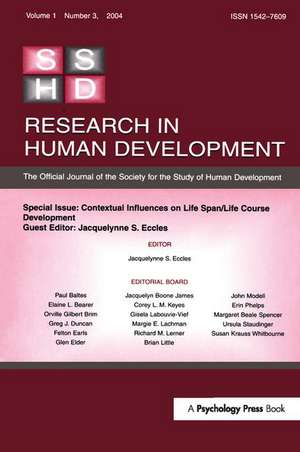Contextual Influences on Life Span/life Course: A Special Issue of Research in Human Development
Editat de Jacquelynne S. Ecclesen Limba Engleză Hardback – 20 apr 2017
Preț: 764.20 lei
Preț vechi: 1154.58 lei
-34% Nou
Puncte Express: 1146
Preț estimativ în valută:
146.23€ • 153.08$ • 120.100£
146.23€ • 153.08$ • 120.100£
Carte tipărită la comandă
Livrare economică 07-21 aprilie
Preluare comenzi: 021 569.72.76
Specificații
ISBN-13: 9781138164833
ISBN-10: 1138164836
Pagini: 102
Dimensiuni: 152 x 229 mm
Greutate: 0.45 kg
Ediția:1
Editura: Taylor & Francis
Colecția Routledge
Locul publicării:Oxford, United Kingdom
ISBN-10: 1138164836
Pagini: 102
Dimensiuni: 152 x 229 mm
Greutate: 0.45 kg
Ediția:1
Editura: Taylor & Francis
Colecția Routledge
Locul publicării:Oxford, United Kingdom
Public țintă
ProfessionalCuprins
Volume 1, Number 3, 2004
Contents: P.B. Baltes, J. Smith, Lifespan Psychology: From Developmental Contextualism to Developmental Biocultural Co-Constructivism. C.G. Coll, The Interpenetration of Culture and Biology in Human Development. K.U. Mayer, Whose Lives? How History, Societies, and Institutions Define and Shape Life Courses. A.J. Stewart, C. McDermott, Civic Engagement, Political Identity, and Generation in Developmental Context. S.J. Suomi, How Gene-Environment Interactions Shape Biobehavioral Development: Lessons From Studies With Rhesus Monkeys.
Contents: P.B. Baltes, J. Smith, Lifespan Psychology: From Developmental Contextualism to Developmental Biocultural Co-Constructivism. C.G. Coll, The Interpenetration of Culture and Biology in Human Development. K.U. Mayer, Whose Lives? How History, Societies, and Institutions Define and Shape Life Courses. A.J. Stewart, C. McDermott, Civic Engagement, Political Identity, and Generation in Developmental Context. S.J. Suomi, How Gene-Environment Interactions Shape Biobehavioral Development: Lessons From Studies With Rhesus Monkeys.
Descriere
This special issue covers different aspects of life course development. The central argument of the first paper is that human development should be viewed as the product of the interpenetration of cultural and biological processes. The following article
